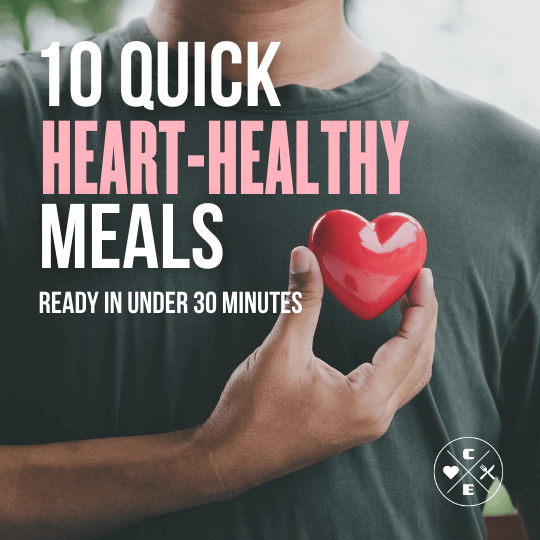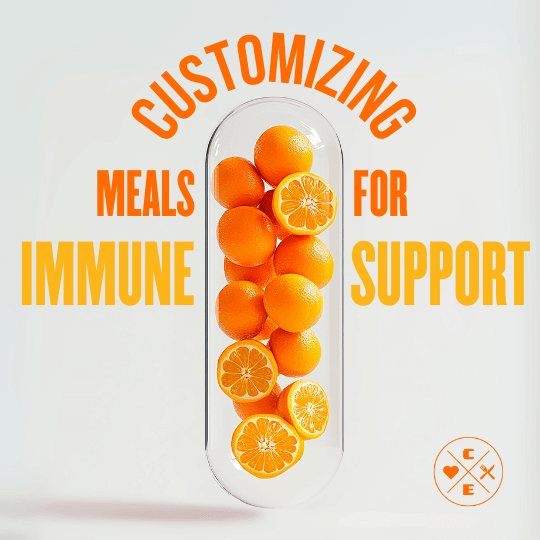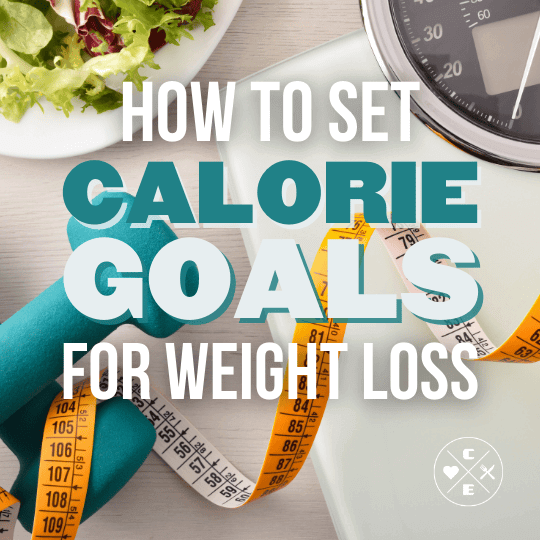The Anti-Meal-Prep Dinner Strategy: Fresh Meals Every Night Without the Waste

Jason Nista
Nutrition
|
Healthy Recipes
|
Weight Loss
11/07/2025 1:40pm
13 minute read
Quick Answer: You can eat fresh dinners every night without wasting groceries or spending hours cooking. Buy these 15 versatile ingredients once, do 15 minutes of prep on Sunday, then cook any of 5+ different meals fresh in 20 minutes each night. No containers of sad leftovers, no boredom, no waste. This is for people who hate traditional meal prep but still want to eat well.
Table of Contents
Why Traditional Meal Prep Doesn't Work for Everyone
Let me guess: you've tried meal prep. You spent three hours on Sunday cooking chicken and broccoli and quinoa. You portioned everything into containers. By Wednesday, you were staring at those containers thinking "I cannot eat this again." By Thursday, you ordered takeout. By Friday, the containers were still in your fridge, silently judging you.
Here's what nobody tells you about traditional meal prep: **it works great for some people and makes other people miserable.** If you're someone who values variety, who gets bored eating the same thing twice, who actually enjoys the act of cooking but hates the time commitment—traditional meal prep is your enemy, not your friend.
The internet is full of comprehensive meal prep guides teaching you how to batch cook for hours. That's not this. This is the opposite: a system for people who want to eat FRESH dinners every single night without wasting groceries or spending 20 hours in the kitchen.
The trick? Stop thinking in recipes. Start thinking in ingredients.
The 15-Ingredient System Explained
The Core Concept
Most people shop for recipes. They find a recipe for lemon garlic chicken, buy everything needed, make it once, then have half a jar of capers and three-quarters of a bottle of white wine taking up space. Next week, different recipe, different leftover ingredients. This is how you end up with a fridge full of half-used things and nothing to actually make for dinner.
The 15-ingredient system flips this. You buy 15 versatile ingredients that work together in multiple combinations. Think of it like having 15 Lego bricks that can build 20 different structures instead of 50 specialized pieces that only build one thing.
Why This Works
**Ingredient overlap = zero waste.** Every item on your list appears in at least 3-4 different meals. Bell peppers work in stir-fries, sheet pan dinners, tacos, and pasta. Chicken can be grilled, sautéed, roasted, or shredded. Nothing sits unused.
**Strategic variety = no boredom.** Five completely different dinners from the same base ingredients means you're eating fresh every night without the decision fatigue of planning seven unique meals.
**Minimal prep = sustainable.** Fifteen minutes on Sunday to wash vegetables and portion proteins. That's it. The actual cooking happens fresh each night in 20 minutes. No marathon cooking sessions means you'll actually stick with it.
Your Weekly Shopping List
This list costs approximately $60-75 depending on your location and protein choices. It makes 5-7 dinners for one person, or 5 dinners for two people.
Proteins (Pick 3)
- Chicken breast - 1.5-2 lbs ($8-12) - Most versatile, works in everything
- Ground turkey - 1 lb ($5-7) - Quick-cooking, great for bowls and tacos
- Salmon fillets - 3-4 portions ($12-16) - Higher cost but omega-3 rich
- Eggs - 1 dozen ($3-5) - Backup protein for lazy nights
Vegetables (Pick 6)
- Bell peppers - 3-4 peppers ($4-6) - Color, crunch, works everywhere
- Broccoli - 2 crowns ($4-5) - Roasts beautifully, adds bulk
- Spinach - 1 large container ($4) - Quick-wilting for pasta, eggs, bowls
- Cherry tomatoes - 1 pint ($3-4) - No chopping needed, roasts well
- Onion - 2 yellow onions ($2) - Flavor base for everything
- Garlic - 1 bulb ($1) - Non-negotiable flavor
Grains & Carbs (Pick 2)
- Brown rice - 2 cups dry ($2) - Cook a big batch on Sunday
- Whole wheat pasta - 1 box ($2-3) - Emergency quick dinner
Pantry Staples (Have These)
- Olive oil - For cooking everything
- Soy sauce - Instant umami and salt
- Italian seasoning - Covers most flavor needs
Bonus Items (Optional but Valuable)
- Lime or lemon ($1) - Brightness that transforms dishes
- Shredded cheese ($4) - Makes everything feel indulgent
- Hot sauce - Because some nights need heat
Total cost: $60-75 for the week (approximately $8-12 per dinner)
The 15-Minute Sunday Prep
This is NOT traditional meal prep. You're not cooking anything. You're just making weeknight cooking faster.
The 15-Minute Checklist:
1. Wash and dry vegetables (5 minutes)
- Wash bell peppers, broccoli, cherry tomatoes
- Spin dry spinach if needed
- Store in containers with paper towels to absorb moisture
2. Portion proteins (5 minutes)
- Divide chicken breasts into individual portions
- Separate salmon fillets
- If using ground turkey all week, leave as-is; if only using half, freeze the other half
- Label everything with the day you plan to use it
3. Cook base grain (5 minutes active, 40 minutes total)
- Make a big pot of brown rice or quinoa
- Store in fridge in an airtight container
- This is the only thing you pre-cook, and it's optional
4. Strategic freezing
- If you're cooking Wednesday, Thursday, Friday → freeze Thursday's protein on Sunday
- If you're cooking Monday through Friday → freeze Thursday and Friday proteins
- This prevents anything going bad mid-week
That's it. Fifteen minutes of prep that makes every weeknight dinner 10 minutes faster. No containers of fully cooked food. No eating the same thing repeatedly. Just smart setup.
5 Fresh Dinner Formulas
These aren't recipes with exact measurements. They're formulas—templates you can customize based on what you have and what sounds good that night.
Formula 1: Sheet Pan Protein + Vegetables
Base structure: Protein + 2-3 vegetables + olive oil + seasonings → 425°F oven for 20-25 minutes
Version A: Chicken + bell peppers + broccoli + Italian seasoning
Version B: Salmon + cherry tomatoes + onions + garlic + olive oil + salt
Why it works: Everything cooks on one pan while you do literally anything else. Clean up takes 60 seconds.
Formula 2: Quick Stir-Fry
Base structure: Protein (sliced thin) + vegetables (bite-size) + soy sauce + garlic → high heat, 8-10 minutes total
Version A: Chicken + bell peppers + broccoli + soy sauce over rice
Version B: Ground turkey + spinach + onions + eggs (fried rice style)
Why it works: Fast, uses one pan, feels restaurant-quality because of the high heat sear.
Formula 3: Bowl Assembly
Base structure: Grain base + protein + roasted or raw vegetables + sauce
Version A: Brown rice + grilled chicken + roasted broccoli + soy-ginger sauce
Version B: Rice + ground turkey + sautéed peppers and onions + salsa + cheese (burrito bowl)
Why it works: Visually appealing, easy to portion, feels substantial. Use your pre-made rice to make it even faster.
Formula 4: Quick Pasta
Base structure: Pasta + protein + vegetables + olive oil + seasonings
Version A: Whole wheat pasta + chicken + cherry tomatoes + spinach + garlic + olive oil + Italian seasoning
Version B: Pasta + ground turkey + onions + jarred marinara (cheat night - buy the sauce)
Why it works: Pasta cooks in 8-10 minutes. Everything else cooks while the pasta boils. Dinner in 15 minutes flat.
Formula 5: Egg-Based Quick Fix
Base structure: Eggs + whatever vegetables are left + cheese
Version A: Scrambled eggs + sautéed peppers and onions + cheese (breakfast for dinner)
Version B: Frittata - eggs + spinach + cherry tomatoes + any leftover cooked protein → bake 15 minutes
Why it works: Emergency dinners when you're exhausted. Eggs cook in 5 minutes. Uses up anything that's about to go bad.
Sample Week: How It Actually Works
Here's what a real week looks like using this system. Notice how the same ingredients create completely different meals:
Monday: Sheet pan chicken with bell peppers and broccoli (Formula 1)
Time: 25 minutes (5 min prep, 20 min hands-off cooking)
Tuesday: Ground turkey stir-fry with bell peppers and onions over rice (Formula 2)
Time: 18 minutes (all active cooking)
Wednesday: Salmon with roasted cherry tomatoes and broccoli (Formula 1)
Time: 25 minutes (5 min prep, 20 min hands-off cooking)
Thursday: Burrito bowl - rice, ground turkey, sautéed peppers/onions, cheese (Formula 3)
Time: 15 minutes (using pre-cooked rice)
Friday: Quick pasta with chicken, spinach, cherry tomatoes, garlic (Formula 4)
Time: 15 minutes
Saturday/Sunday: This is when you either eat out, use the egg formula for a lazy dinner, or have Clean Eatz Kitchen meals on hand for zero-effort nights.
What you used: All 3 proteins, all 6 vegetables, both grains. Nothing wasted. Five completely different meals. Every night felt fresh.
When to Cook vs. When to Order
Let's be realistic: some weeks you won't cook five nights. Some nights, even 20 minutes feels impossible. That's normal, not failure. The goal is having options, not being perfect.
The Hybrid Approach (Most Sustainable)
**Cook fresh: 3-4 nights per week** when you have energy and time
**Use prepared meals: 2-3 nights per week** when you don't
This is where Clean Eatz Kitchen's Build Your Meal Plan makes sense. At $8.99 per meal, it's comparable to your cost for cooking (when you factor in your time). Keep 6-12 meals in your freezer as backup. They heat in 4 minutes. Some nights, that 16-minute difference between cooking and heating matters.
When to Cook:
- You have 20+ minutes and moderate energy
- You're cooking for two people (economies of scale)
- You actually enjoy cooking and find it relaxing
- You want specific flavors not available in prepared meals
When to Order/Heat Prepared:
- Work was brutal and your brain is fried
- You have less than 15 minutes before you need to eat
- The alternative is fast food or expensive takeout
- You've cooked 3-4 nights already this week
Check out our cost comparison guide to see how mixing homemade and prepared meals actually saves money compared to either extreme.
Common Mistakes That Kill This System
Mistake #1: Buying Too Many Ingredients
More ingredients = more waste and more complexity. Stick to 15. The system works because of constraint, not abundance. If you buy 30 ingredients "for variety," you'll waste half of them.
Mistake #2: Trying to Cook 7 Nights
Nobody successfully cooks fresh every single night unless that's their hobby. Plan for 4-5 cooked meals, have backup options. Expecting perfection guarantees failure.
Mistake #3: Not Actually Doing the Sunday Prep
Skipping that 15-minute prep means every weeknight dinner takes 30-35 minutes instead of 20. Those extra 10-15 minutes are the difference between "this is manageable" and "screw it, ordering pizza."
Mistake #4: Buying Proteins and Letting Them Sit
Chicken bought on Sunday needs to be cooked by Tuesday or frozen immediately. Fish should be cooked within 48 hours. Ground meat goes bad fast. If you're not cooking Monday-Tuesday, freeze Wednesday-Friday proteins on Sunday. Food safety matters.
Mistake #5: Not Having a Backup Plan
The week you don't have 6-12 prepared meals in your freezer is the week everything goes wrong. Keep backup meals stocked. The goal is eating well, not proving you can cook every night.
Mistake #6: Choosing Ingredients You Don't Actually Like
If you hate broccoli, don't buy broccoli just because it's on this list. Swap it for zucchini or cauliflower or green beans. The system works with any vegetables—pick ones you'll actually eat.
Frequently Asked Questions
Can I eat fresh dinners without wasting groceries?
Yes. The key is buying ingredients that work across multiple meals rather than shopping for individual recipes. With the 15-ingredient system, you buy versatile staples once and use them in different combinations throughout the week. Nothing sits unused because every ingredient appears in at least 3 different meals.
How is this different from regular meal prep?
Traditional meal prep means cooking everything on Sunday and eating leftovers all week. This system means doing 15 minutes of prep on Sunday (washing vegetables, portioning proteins), then cooking fresh each night in 20 minutes. You get variety and freshness without the waste or boredom of eating the same meal repeatedly.
Do I really only need 15 ingredients for a whole week?
Yes. The 15-ingredient list includes 3 proteins, 6 vegetables, 3 pantry items, 2 grains, and 1 sauce base. These combine into 5+ completely different meals. The system works because ingredients are chosen for versatility - chicken works in stir-fry, sheet pan, and bowl meals; bell peppers go in tacos, pasta, and stir-fries.
What if I don't have 20 minutes to cook every night?
Then this system isn't for you on those nights - and that's okay. The realistic approach is using this system 3-4 nights per week and having backup options like Clean Eatz Kitchen meals for nights when even 20 minutes feels impossible. The goal is flexibility, not perfection.
How much does this cost compared to meal delivery?
The 15-ingredient shopping list costs approximately $60-75 for the week and makes 5-7 dinners, averaging $8-12 per meal depending on your protein choices. This is comparable to prepared meal delivery but requires 20 minutes of cooking per meal. The best strategy is often a hybrid: cook 3-4 nights, use prepared meals 2-3 nights.
Can I customize the ingredient list?
Absolutely. The list is a template, not a rule. Swap proteins (salmon instead of chicken), change vegetables (zucchini instead of broccoli), or adjust grains (cauliflower rice instead of regular rice). The system works with any ingredients as long as you follow the formula: choose items that work in multiple meal types.
What about food safety with fresh ingredients?
Buy proteins on Sunday and either cook within 2 days or freeze immediately for later in the week. Vegetables stay fresh 5-7 days when stored properly (wash and store in containers with paper towels). Ground meat should be used within 1-2 days unless frozen. The Sunday prep includes portioning proteins for freezing, so nothing goes bad.
The Bottom Line
Traditional meal prep isn't wrong—it's just not for everyone. If you're someone who values variety and freshness over maximum convenience, this 15-ingredient system gives you the best of both worlds: fresh dinners every night without the grocery waste or decision fatigue.
The key is thinking in systems, not recipes. Buy versatile ingredients. Do minimal Sunday prep. Cook fresh in 20 minutes. Have backup meals for exhausted nights. This isn't about being perfect—it's about having a sustainable way to eat well that doesn't make you miserable.
Try it for one week. Buy the 15 ingredients. Do the Sunday prep. Cook 3-4 nights and use prepared meals the other nights. See how it feels. If you hate it, you're out $75 and you learned something about what does and doesn't work for you.
And if you find that even this is too much? That's what Clean Eatz Kitchen meal delivery exists for. No shame in choosing convenience when cooking just doesn't fit your life. The goal is eating well consistently, not proving you can cook every meal from scratch.
Your relationship with food should make your life better, not harder. Find the system that works for you, whether that's cooking fresh every night, traditional meal prep, prepared meals, or some hybrid of all three. There's no prize for suffering through a system you hate.
Related Articles
How to Build Meals That Support Your Immune System
9 minute read
How to Set Calorie Goals for Weight Loss (2026 Guide)
12 minute read



